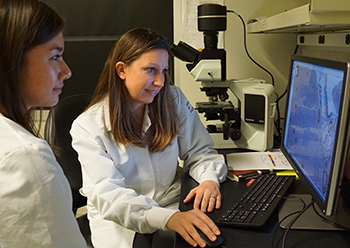
Brittany Dugger assesses a sample from the UC Davis Alzheimer’s Disease Center’s brain bank, which holds more than 30,000 post-mortem slides from individuals with dementia and related disorders.
“My maternal grandmother had dementia with hallucinations and more pronounced personality changes while my father’s mother didn’t remember who I was but could remember to sit in the same pew even though it wasn’t a church she grew up in or was very familiar with before the disease,” said Dugger, an assistant professor within the Department of Pathology and Laboratory Medicine and the UC Davis Alzheimer’s Disease Center.
“I want to understand the underlying basis for these different phenotypes — why did both relatives have the same diagnosis but behave completely differently?” she said.
Thanks to a $265,000 Multi-campus Research Programs and Initiatives (MRPI) grant from the University of California Office of the President (UCOP), Dugger will lead a team of researchers to create resources to understand why. She is leading an effort to organize and digitize representative microscope slides of dementia and Alzheimer’s disease from brain banks at UC Davis, UC Irvine and UC Los Angeles to generate reference materials of common pathologies found within the brains of subjects with dementia for educational, consultation and research purposes.
“Large datasets of dementia and cognitively normal slides are needed so we can develop and test machine-learning algorithms and adequately train the next generation of neuropathology students who need to see multiple types of lesions across numerous brain regions using a variety of histological stains,” Dugger said.
To generate the database each brain bank will contribute some 200 representative slides of major pathologies commonly found within Alzheimer’s disease, cerebrovascular disease and normal brain tissue. Also involved in the project is John-Paul Graff, an assistant professor and one of the leaders of the Machine Learning Working Group at UC Davis School of Medicine, and researchers at UC San Francisco who will contribute computational methods for annotating slides.
Nearly 1 million Californians are expected to suffer from Alzheimer’s disease and related disorders by 2025, an increase of some 33 percent. The work aligns with the goals of the National Alzheimer’s Project Act, an effort to help change the trajectory of Alzheimer's disease and related dementias.
UCOP awarded more than $9 million in MRPI grants to 16 collaborative research projects across the system. Dugger is the only UC Davis Health researcher to lead a project. Read more about this year’s awarded projects at UC Davis online.

